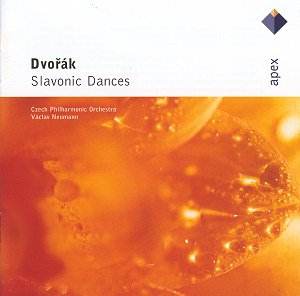These marvellously infectious
works are among Dvořák’s most popular, so it comes as no surprise
to find a number of excellent versions gracing the record catalogue.
In this budget (or lower mid-price) category, there are very recommendable
discs from Kubelik and the Bavarian RSO (DG), Maazel and the
Berlin Phil.(EMI Red Line), Dorati and the Minneapolis SO (Mercury)
and, best of all, Szell and the Cleveland on Sony Essential. Actually,
the Szell disc is the only top rated one truly in the Apex super-budget
category, so for new collectors, or those on a very tight budget, this
new re-issue by Neumann and the superb Czech Philharmonic may well appeal,
providing as it does a suitable foil for the rather hard driven Szell.
In fact, it may well be axiomatic that this Neumann
version (which, I have to confess, is new to me) was always going to
be idiomatically played and a pleasure to listen to. This is indeed
the case, with supple, flexible string playing, beautifully characterful
wind solos and heroic, full-toned brass playing. The recording (early
70s analogue) is warm and full-bodied, with a nicely resonant acoustic.
Neumann’s tempi are, on the whole, more relaxed than
Szell’s (which is not difficult). This may make for a less exciting
time in some of the more energetic dances (particularly the two Furiants),
but brings many rewards in other areas. Neumann often brings out the
playfulness of the pieces, pointing up their close proximity to the
polkas and waltzes of Strauss’s Vienna. Buried cello lines, rich in
descant resonance, are teased out by Neumann (as in the E minor Dumka,
Op.72 No.10), and the warm yet transparent textures of this great orchestra
are allowed to sing. There is certainly a rush of adrenalin where required,
though grace and elegance, rather than fierceness, are the main hallmarks.
The wonderful C major Furiant that opens the first set (surely
a cousin to the corresponding Furiant movement of the 6th
Symphony) has a crispness of attack, as well as light and shade, that
are as compelling as Szell’s admittedly high-octane thrills. If Szell
is a shade brisker in the allegros and prestos, Neumann certainly keeps
things flowing in the slower pieces, so that the Lento grazioso
of the final dance, No.8 in A flat, keeps its dance overtones.
Indeed, I found very little to complain about in these
performances. Dynamic contrasts are sharply defined through all the
dances, and one is constantly made aware of the beauty and subtlety
of the instrumentation. Collectors who know and love these works will
no doubt already have their favourite version – there are many excellent
full price discs from, among others, Previn, Pletnev and Dohnanyi, as
well as Czech rivals from Talich and Ancerl. But given the market that
Apex issues are aimed at, to say nothing of the many musical reasons,
this disc should find its place, and it really does deserve success.
Tony Haywood

